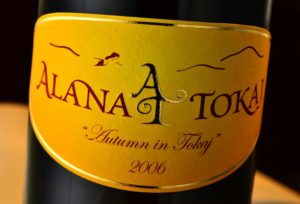 Summer wine drinkers often focus on refreshing dry, crisp white wines, but there’s no reason why refreshment can’t be sweet. So if you want a new experience, why not try some of Hungary’s most glorious Tokaji?
Summer wine drinkers often focus on refreshing dry, crisp white wines, but there’s no reason why refreshment can’t be sweet. So if you want a new experience, why not try some of Hungary’s most glorious Tokaji?
These wines bear the same name of the region with the addition of the letter “i” at the end–Tokaji–which translates as “from Tokaj.” The region produces both dry and sweet wines from Hungarian grapes, but the sweet ones are surely the most exquisite. Like Sauternes from Bordeaux, Hungarians make Tokaji wines from late-harvest grapes that have shriveled on the vine after developing “noble rot,” a fungus called Botrytis cinerea.
Who would have thought that rotten grapes could taste so good? It appears that a few hundred years ago German and Hungarian winemakers accidentally discovered the utility of this rot when they fell behind schedule with their harvests. They picked the shriveled grapes and fermented them anyway, which, to their surprise, produced fantastically sweet and delicious wines. Today, winemakers located in the handful of places where the right conditions exist (areas with misty, foggy mornings and dry, sunny afternoons) make these wonderful botrytized wines, which are pricey as the grapes must be carefully cultivated and handpicked.
The Hungarians process for making botrytized wine is different than that of Bordeaux and elsewhere. Rather than simply squeezing the sweet grapes and fermenting the juice, they sort out the the aszú grapes (those dehydrated by noble rot) and the unaffected ones into separate lots. They make a dry wine with the unaffected grapes, which they use as a base, and they pound the aszú grapes together to form a sugary paste that is then added to the dry base wine. The amount of paste added is expressed as puttonyos, ranging up to six puttonyos for the sweetest wines. In addition, the native Hungarian grapes–mostly Furmint and Hárslevelű—also add a unique character. This process produces rich and complex sweet wines that are perfect pairing for foie gras, desert, or enjoyed alone.
Among my favorites is the Tokaji Cuvee “Autumn in Tokaj” produced by Alana-Tokaj. Made with Hárslevelű Furmint, and Zéta grapes, it is a deliciously rich wine offering savory flavors of tangerine and apricots. This one may be hard to find, but you can ask your local retailer to track one down by contacting Alana-Tokaj. The Wine Advocate’s Neil Marin scored this wine a 91 in a article reviewing Tokaji wines, noting: “The palate has a lovely viscous texture with almond, honeysuckle, passion fruit and a touch of quince. Harmonious, not particularly complex but very refined on the finish with a hint of lemony dried honey on the aftertaste that adroitly disguises the 165gms/L residual sugar. This leaves me with a smile on my face. Drink now-2015+.”
For a more lemony approach, try the Dobogó Tokaji Aszú 6 Puttonyos 2004. This very rich and sweet wine is the winner of the Decanter World Wine Awards in the category of Regional Grand Prize for Central and Eastern European sweet wines. Again, ask your wine retailer to track down a bottle (expect to pay $80 or more for a half bottle) from the importer: Winebow. This vintage may be running low, so you also might consider trying the next vintage, which is likely a good one.
The Patricius – Tokaji Aszú 5 Puttonyos is superb, which can be had for about a very good price of $60 considering the quality. I’ve tried the 2000 vintage, which Wine Spectator rates 94 noting: “Complex aromas and flavors of honey, vanilla cream, spice and marmalade highlight this rich, harmonious white. The structure is bracing, providing more of an off-dry feel. Has a lingering aftertaste of mineral. Drink now through 2030.” It is priced around $40-$50 a bottle (a bargain), and has won several awards including the Vinagora International Wine Challenge 2004, Budapest Gold Medal; the Decanter World Wine Awards 2006, the London Silver Medal; and the Japan Wine Challenge 2006, Tokyo Silver Medal. In 2009 it was among Wine Spectators top 100 wines for the year, ranking No. 44. It is available online from the Blue Danube Wine Company.
Even if you never find one of the above noted wines locally, consider exploring Tokaji wines generally. These are truly unique and special wines—worth laying out a few extra bucks as a special treat. All wine lovers should experience and enjoy Tokaji.
Originally published on Examiner.com.